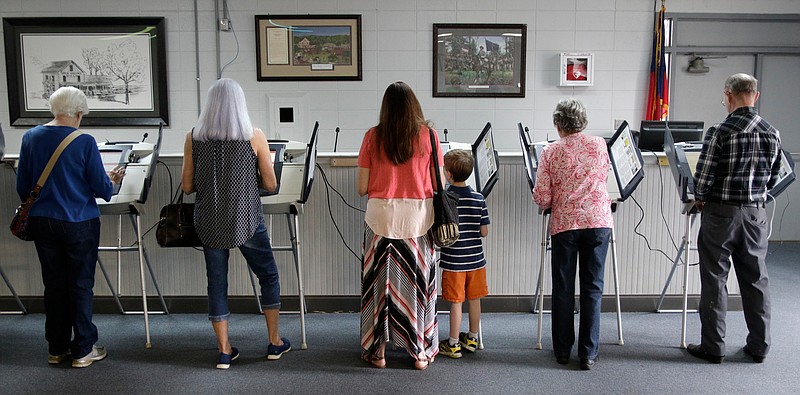Primary elections are about selecting candidates to carry the party banner. But in Georgia, there's an added feature - the parties can use the ballot to gather public opinion from their members.
Both the Republican and Democratic parties have prepared a slate of questions for voters on the May 24 primary ballot.
University of Georgia political science professor Charles Bullock said in a phone interview that the ballot questions are there to get feedback from voters, raise interest in the primary contest and perhaps even boost turnout. The questions could also help keep voters engaged till the end of the ballot, Bullock said, because sometimes voters only weigh in on the top-of-the-ticket candidates.
"You can think of it as somewhat of a survey of the party's voters," Charles Bullock said. "So that it could be used by a legislator to say, 'My people want me to do this, I've gotten directions from them. They voted 80-20 on this proposition.'"
The Democrats have nine ballot advisory questions, asking:
- Should the U.S. forgive student debt?
- Should Georgians have paid parental leave?
- Should free preschool be available?
- Should Georgians be able to petition items directly to the ballot?
- Should families earning less than $150,000 have expanded tax credits?
- Should Georgia expand voter access?
- Should marijuana be legalized, taxed and regulated?
- Should Georgia develop renewable energy?
READ MORE: Southern Democrats aim to export Georgia's 2020 success
The Republicans' eight ballot advisory questions are:
- Should securing the U.S. southern border be a priority?
- Should students get educational vouchers to spend wherever they wish?
- Should Georgia follow Florida's lead and stop social media companies from censoring candidates?
- Should federal work visas be based on merit rather than a lottery?
- Should Georgia allow biological males to compete in female sports?
- Should enforcing ballot tampering laws be a priority?
- Should absentee ballot drop boxes be eliminated?
- Should people be able to establish new city governments to better address crime?
(READ MORE: Georgia election bill rooted in Trump supporters' complaints about 2020)
Bullock said including ballot advisory questions started in the 1990s when Georgia Republicans were the minority party in the state.
Other state legislatures that have placed non-binding advisory questions on the ballot include Alaska, Idaho, Illinois, Oregon and Washington, said Mick Bullock (no relation to Charles Bullock), public affairs director for the National Conference of State Legislatures, a non-partisan public officials' association composed of sitting state legislators.
Of those, Washington uses advisory questions more frequently than the other states, Mick Bullock said, because they are required for tax measures.
Ideas for Republican primary advisory questions were received by members of the state committee and approved by the state executive committee, according to an email from a party spokesperson.
"The ballot advisory questions give Republican voters an opportunity to speak directly to important issues facing our state and nation," Georgia Republican Party Chairman David Shafer said in a written statement. "They also give party leaders and elected officials information on Republican voters' priorities ahead of the midterm elections."
(READ MORE: Perdue lags Kemp in fundraising in Georgia governor's race)
The only expenses associated with adding the questions to the ballot is "some staff time," said Walter Jones, a spokesperson with the Secretary of State's Office.
Three ballot questions were on the June 2020 primary ballot.
"These questions cover a broad range of issues of concern to Georgia Republicans," Brandon Moye, Georgia Republican Party executive director, said in a written statement, adding that they are not an endorsement of any candidate or campaign. "The Georgia Republican Party supports a robust discussion of the issues and looks forward to supporting our nominees once they are voted on by voters in the Republican primary."
In 2020, Republican Party leaders asked three ballot advisory questions. Over 73% of Republican primary voters agreed that education dollars should be made available for "public, private, magnet, charter, virtual or homeschool"; a slim majority of 51% wanted the Republican primary limited to only Republican voters and nearly 67% wanted board of education candidates to be required to declare their political party.
Also in 2020, Democratic Party leaders asked six ballot advisory questions. Over 91% of Democrat primary voters agreed that "immediate action" should be taken to combat climate change; nearly 97% wanted to protect the environment from wasteful plastics pollution; 94% agreed with election-day voter registration; 87% wanted an independent commission to draw district lines; 85% wanted to end the cash bail system; and just over 93% wanted those who have served their sentence for a crime to have their voting rights restored.
In 2016, Republican primary voters were asked about whether parents should be given more school choice - and 75% said yes. On the Democratic side, four questions were asked in 2016. Regarding expanding Medicaid, 84% of Democratic primary voters voted yes; 89% supported paid family leave; 88% favored natural vegetative buffers and 80% wanted automatic voter registration.
Contact Andrew Wilkins at awilkins@timesfreepress.com or 423-757-6659. Follow him on Twitter @tweetatwilkins.
